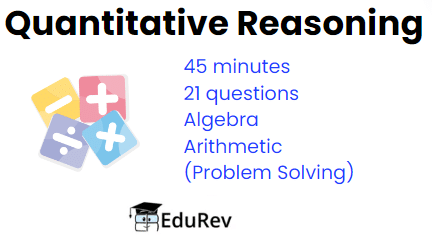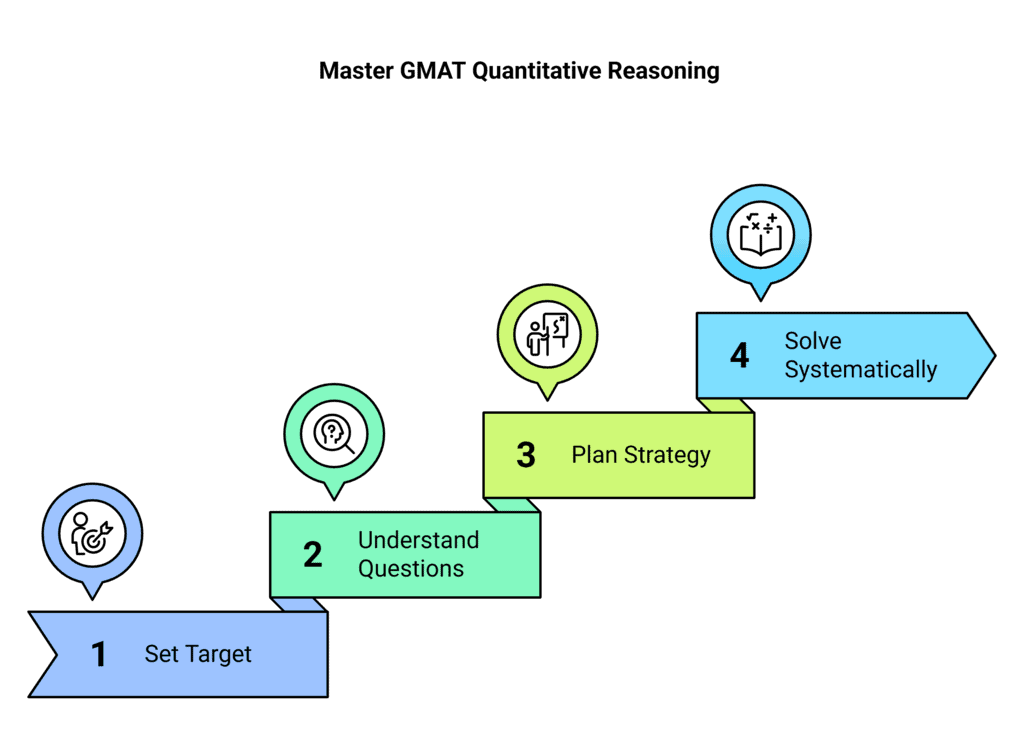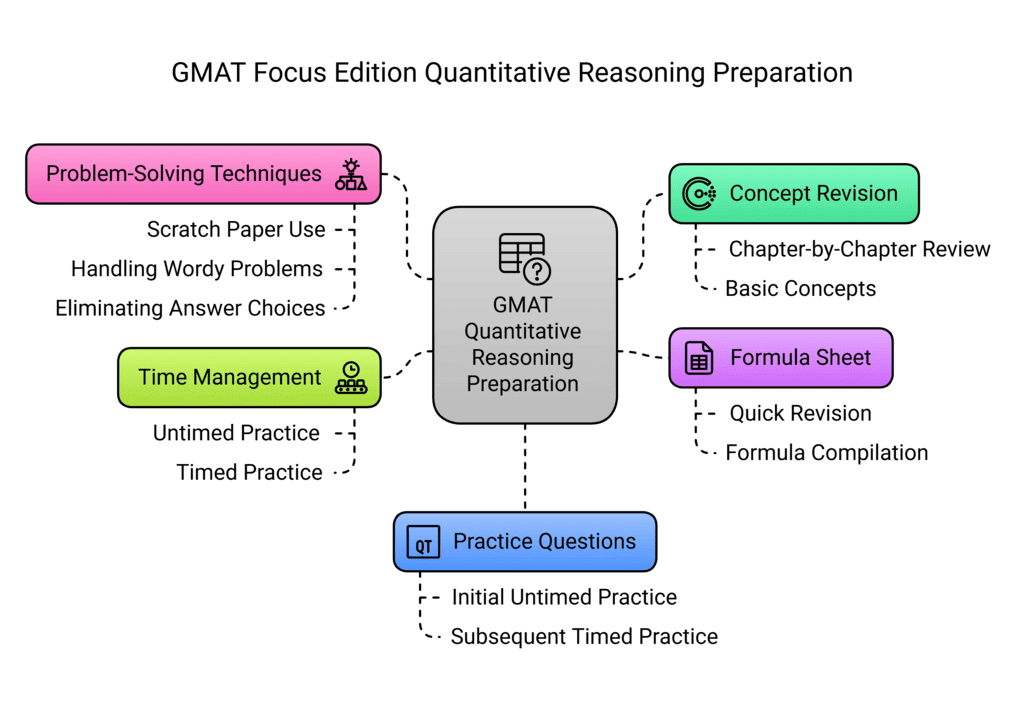How to Prepare for GMAT Quantitative Section | Quantitative for GMAT PDF Download
| Table of contents |

|
| Introduction |

|
| Quantitative Study Guid |

|
| Prepare for GMAT Focus: Quantitative Reasoning |

|
| Tips to Prepare for the GMAT Focus Edition Quantitative Reasoning Section |

|
Introduction
Since the GMAT Focus is used for admission to graduate management programs, your GMAT Focus Edition quant score signifies your ability to deal with the quantitative curriculum in business school.
The Quantitative section of the GMAT Focus can be challenging, especially if you haven’t studied math since high school. However, it doesn’t matter how good or bad you are at mathematics, you can ace the Quant section of the GMAT Focus with thorough preparation.

Now, if you’re wondering how to start preparing for the GMAT Quant, let’s take a look at this GMAT quantitative study guide.
Quantitative Study Guid
1. Take a diagnostic test
Taking a diagnostic test is the first and foremost step that needs to be carried out while preparing for the GMAT Focus.
Practice tests give you a thorough understanding of where you stand in terms of your preparation and show you where you need to put the extra effort.
If possible, create an Excel sheet and add the questions that you have answered incorrectly. Also, find out the answers to those problems, so that you avoid repeating the same mistake again.

2. Revise all that you have learned before
- The concepts tested in the quant section are from elementary math such as – Arithmetic, Algebra, etc., which you probably haven’t studied or practised for long. Hence, spend some time revising and relearning all these basic math concepts.
- You would ideally be unaware of the difficulties that you might come across while solving questions unless you solve them. Hence, once you believe you are thorough with the concepts, you should start solving questions.
Start solving the easy questions at first, then move on to the questions with medium difficulty. Then, find a set of difficult questions and solve them.
3. Create the test environment
Try to simulate the actual test environment at home. For eg., if you are learning quant, find a set of 21 questions and aim to complete them in under 45 minutes (with a 90% attempt rate).
It might take some time for you to get there, but it is essential that this practice is done while preparing for the test to avoid last-minute hassles.
4. Attempt Tests, Analyze them, and finally eliminate mistakes
You need to learn a lot of mathematical concepts in order to score well in the Quant section of the GMAT. However, taking practice tests is as important as learning concepts if you want to perform well on the GMAT.
Analyze your mistakes and keep a track of them. Eliminate the mistakes by practicing more questions. If you still face the same problem, change your method of solving those questions.
You can find Practice Tests/Mock tests for Quant section here:
Prepare for GMAT Focus: Quantitative Reasoning
- It is wise to initiate your preparation with either quantitative reasoning or verbal reasoning.
- Have the data insights section at the last as it essentially encompasses elements from both quantitative reasoning and verbal reasoning sections.
- Before you start preparing for the quant section, have a sectional target for the GMAT focus quant section.
- Ensure to have a realistic target based on your diagnostic test score, your skill set, the time you have to practice, and the score required for your desired college.
Effectively Solving Questions
Whenever you solve any GMAT problem, follow the "Understand, Plan, Solve process". Print out this summary and keep it by you when you’re studying:

Understand the questions
A glance at the answers and the question stem. Anything jumps out—an ugly equation, a diagram, an indication that you might be able to estimate, etc.
Read the question stem. Focus just on understanding what it’s telling you and what it’s asking you.
Jot down what it’s asking, along with any other useful info (equations, etc.). Don’t solve it! Just jot (write or sketch).
Plan the strategy to solve questions
Reflect on what you know so far. Lost? Guess and move on. But if you do understand everything, then consider what your best plan is. Can you estimate anywhere? How heavy? Can you use a real number and just do arithmetic? Is there a way to draw or logic it out? What are they really asking you? This reflection is how I realized I just needed a relative value on the Oil Cylinders problem.
Organize your thoughts and your scratch work to get set up for the Solve stage. Maybe you need to redraw or add something to your diagram. Maybe you need to group the data or equations a little differently.
Solve the questions following a standardized approach
Be systematic: You’re almost there. Write your work down. Don’t try to compress steps or work more quickly than is comfortable for you. Keep your scratch paper organized.
Don’t do more work than you have to: Estimate when you can. Keep an eye on the answers as you work. Eliminate impossible answers as you go. Stop as soon as only one answer letter is left.
Tips to Prepare for the GMAT Focus Edition Quantitative Reasoning Section
- Go chapter by chapter; revise the basic concepts of each chapter.

- Prepare a formula sheet for quick revision before the test.
- Learn techniques and strategies for time management and accuracy.
- Practice GMAT-type questions for each chapter. Initially do untimed practice for high accuracy.
- Later do timed practice to pace you to the test.
- Solving the problems by writing on scratch paper/erasable noteboard helps to avoid mistakes.
- For wordier problems, take one step at a time, read each sentence, and convert mathematically.
- If a particular question consumes time or is difficult to solve, look for ways to eliminate answer choices or approximations. Don’t get stuck in one question for a long time.
- It’s important to complete the section.
Finally, remember your overall goal here: You want to go to business school. The point is not to show how much of a mathematics scholar you are. The point is to learn how to think logically about quant topics—with actual textbook math tossed in there.
|
121 videos|148 docs|111 tests
|
FAQs on How to Prepare for GMAT Quantitative Section - Quantitative for GMAT
| 1. How can I effectively prepare for the GMAT Quantitative Section? |  |
| 2. What are some tips for effectively solving quantitative reasoning questions on the GMAT? |  |
| 3. How can I improve my speed and accuracy in solving GMAT quantitative reasoning questions? |  |
| 4. Are there specific types of quantitative reasoning questions that are more common on the GMAT? |  |
| 5. How can I stay motivated and focused while preparing for the GMAT Quantitative Section? |  |
















